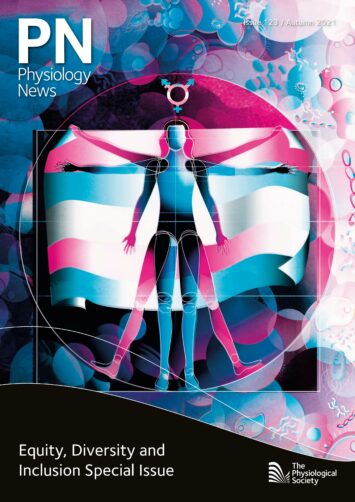
Physiology News Magazine
LGBTQ+ STEM @UCL Network:
Fostering an inclusive and visible community
News and Views
LGBTQ+ STEM @UCL Network:
Fostering an inclusive and visible community
News and Views
https://doi.org/10.36866/pn.123.12
Javier Bautista, Chair and Co-Founder, LGBTQ+ STEM @UCL Network, University College London, UK
During my undergraduate studies at University College London (UCL), I did not know a single LGBTQ+ staff member working in STEM (Science, Technology, Engineering, and Mathematics). Because of this, I always felt that I had to hide my queerness in order to pursue an academic career. However, once I became a PhD student, I started to explore the wonderful queer STEM community, and decided that I wanted to make a difference at UCL by creating a network for LGBTQ+ scientists.
My interest to get involved with the community was sparked back in 2020 when I attended the LGBTQ+ STEMinar, a great conference showcasing the work of queer scientists across the UK. After this event, I reached out to Dr Scott Orr, Dr Luciano Rila and Sarah Beale with the idea of creating a platform at UCL that celebrates diversity and excellence at all career stages. Together, we founded the LGBTQ+ STEM @UCL Network, a student-staff partnership that aspires to promote the disruptive thinking of UCL staff and students who identify as LGBTQ+ working in STEM fields.
It is not surprising that according to UCL’s 2017 Staff Survey, over 40% of UCL LGBTQ+ staff respondents reported that they did not discuss their personal lives openly at work or were not out in the workplace (1) In addition, an American study surveying LGBTQ+ STEM professionals showed queer scientists were more likely to experience career limitations and harassment, and to consider leaving a STEM career (2). The culture of STEM disciplines has long been considered to lean away from the overlap between personal and professional lives. The international nature of science has also caused particular concerns for members of the scientific LGBTQ+ community as it increases the likelihood of interacting with cultures that were not yet inclusive of queerness (i.e. attending conferences or doing fieldwork in countries where LGBTQ+ people are criminalised).
Since the launch of our Network in September 2020, we have grown to a community of more than 200 members. We have organised several events highlighting topics relevant to LGBTQ+ scientists, and hosted social events, talks by invited guests and workshops. For example, one of our talks was about the GaySoc at UCL, which is believed to be the first queer society affiliated to the Students’ Union founded in a UK university. We also collaborated in organising UCL’s LGBTQ+ STEM Festival 2021, a series of free online events connecting and celebrating diversity in STEM, as well as running workshops and panels with queer STEM initiatives, such as EDIS, ALBA and PRIDE in STEM, and social gatherings (3, 4, 5).
In the future, we will start hosting in-person social events and hope to closely collaborate with other LGBTQ+ and EDI initiatives raising awareness of the challenges faced by marginalised identities. In addition, there have been discussions about creating a conference highlighting the research carried out by queer scientists, as well as organising an event combining drag, cabaret and science.
A visible LGBTQ+ presence in STEM disciplines is imperative to foster a supportive and productive environment for members of our community. These are the reasons why we want to broaden wider perceptions of LGBTQ+ identities in STEM disciplines, providing a safe space for meaningful connections where queer students and staff can discuss important issues. However, these changes cannot be carried out by the LGBTQ+ community alone. We also need support through allyship, changes in institution policies and wider support for initiatives that make the workplace more welcoming for students and staff, combined with efforts towards gender, race and disability equity.
If you would like to reach out to us, collaborate or get involved, email lgbtq.stem@ucl.ac.uk. You can also follow us on Twitter at @LGBTQSTEMatUCL.
References
1. Ucl.ac.uk. (2021). LGBTQ+ Equality Steering Group. https://www.ucl.ac.uk/equality-diversity-inclusion/committees-and-social-networks/lgbtq-equality-
steering-group [Accessed 21 June 2021]
2. Cech EA, Waidzunas TJ (2021). Systemic inequalities for LGBTQ professionals in STEM. Science Advances 7, eabe0933.
3. Equality, Diversity and Inclusion in Science and Health. https://edisgroup.org
4. ALBA- Our aims and objectives. https://albalbtwomen.wordpress.com/our-aims-and-objectives/
5. PRIDE in STEM. https://prideinstem.org/
